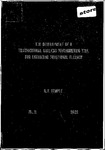THE DEVELOPMENT OF A TRANSACTIONAL ANALYSIS PSYCHOMETRIC TOOL FOR ENHANCING FUNCTIONAL FLUENCY
| dc.contributor.author | TEMPLE, SUSANNAH FLEUR | |
| dc.contributor.other | Faculty of Arts, Humanities and Business | en_US |
| dc.date.accessioned | 2012-08-10T13:14:56Z | |
| dc.date.available | 2012-08-10T13:14:56Z | |
| dc.date.issued | 2002 | |
| dc.identifier | Not available | en_US |
| dc.identifier.uri | http://hdl.handle.net/10026.1/1142 | |
| dc.description.abstract |
Functional Fluency denotes efficacy of interpersonal functioning in terms of flexibility and balance of the behavioural modes a person uses. The aim of this project is to design and create a psychometric tool for mapping the patterns of such functioning. The intention is that feedback on the test results will stimulate the insights and understanding to support and encourage positive behavioural change. This process, involving the development of self-awareness, which is a key aspect of emotional intelligence, will thus promote emotional literacy. Transactional Analysis (TA) ego state theory provides the basis for the rational-theoretical strategy of instrument construction, which uses the author's expanded TA model of ego state function, the Functional Fluency model. The resulting self-report questionnaire, the Transactional Behaviour Profile, comprises a nine-scale index of Functional Fluency, the FFI. Methodological process includes construct conceptualisation, generation of behavioural indicators and transformation of these into test items. Validation of test items leads into instrument construction followed by a Pilot Study with over 300 respondents from a broad span of human service provision. Quantitative and qualitative data analyses provide evidence of both theoretical coherence and validity of the model as well as practical efficacy of the instrument in terms of the project aims. Indications for further refinement and correlation studies are examined, and plans proposed. The theory of Transactional Analysis addresses both the interpersonal and the intrapsychic. The FFI is designed to do likewise. Thus, although the FFI model is essentially one of interpersonal functioning, appropriate in a tool for training and personal development, it could potentially contribute an objective form of behavioural diagnosis in psychotherapeutic contexts, because of its coherent theoretical links with TA structural ego state models. The thesis constitutes the research basis for what will be ongoing development of the Transactional Behaviour Profile for indexing Functional Fluency in a variety of contexts. | en_US |
| dc.language.iso | en | en_US |
| dc.publisher | University of Plymouth | en_US |
| dc.title | THE DEVELOPMENT OF A TRANSACTIONAL ANALYSIS PSYCHOMETRIC TOOL FOR ENHANCING FUNCTIONAL FLUENCY | en_US |
| dc.type | Thesis | |
| plymouth.version | Full version | en_US |
| dc.identifier.doi | http://dx.doi.org/10.24382/4399 |
Files in this item
This item appears in the following Collection(s)
-
01 Research Theses Main Collection
Research Theses Main


